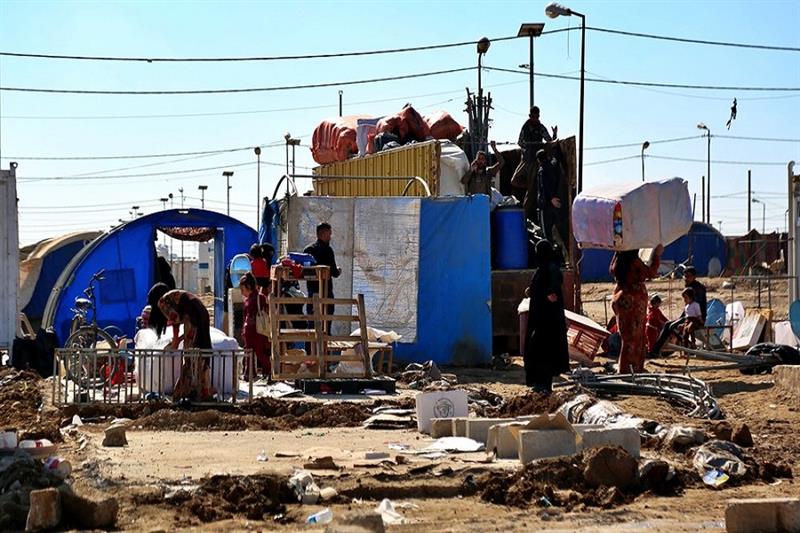
File Photo: Displaced Iraqis pack up in preparations to return to their homes in Jadah 5 camp in northern Iraq, Thursday, Feb. 4, 2021. AP
The statement said the camp’s closure came as part of a government program aiming to “end the displacement file” in the country, where 1.2 million Iraqis remain internally displaced after years of conflict.
Aid workers criticized the closure as hasty and chaotic.
On Monday, residents and aid workers at the Jadah 5 camp in northern Iraq’s Qayyarah — which housed some 300 families — were informed by government and security officials that they had to leave the camp by Wednesday, a day before the beginning of the Muslim celebration of Eid al-Fitr.
Iraq has long sought to close down the displacement camp, one of the last remaining in federally controlled areas, but faced pushback from aid groups concerned over the integration of vulnerable families, including many women and children, stigmatized for their perceived or real affiliation with IS.
Aid workers Tuesday said they had been locked out of the camp by security forces and residents were being evicted after being given two days’ notice to leave. An Associated Press correspondent who attempted to reach the camp found it surrounded by a heavy security deployment and was not allowed to access the premises.
Several official notices of closure had been sent to the camp over the past year and a half but were later delayed. This time, however, the closure came sooner than expected.
On March 23, Iraq’s Ministry of Migration and Displacement sent a letter to the International Organization for Migration, which coordinates humanitarian aid in the camp, informing it that the camp would be shut down in 60 days. The letter did not cite a reason for the closure.
A spokesperson for the IOM said the organization is aware that residents have received notice that the camp will be closed but declined to comment further.
“They all must leave , they don’t have another option,” said Ali Abbas, a spokesperson for the ministry. He said each family had been given 1,500,000 Iraqi dinar (about $1030) to find new housing.
Abbas did not give a reason for the closure decision, and it was not clear why the ministry had moved up the May deadline cited in the letter.
The ministry statement, reported by state media, said that “all the displaced have returned to their original areas of residence on a voluntary basis."
The order to vacate the camp on Monday, “was sudden, with no notice,” said a worker with an aid organization operating in the camp, speaking on condition of anonymity for fear that the government would retaliate against the non-governmental organization. “So (residents) were confused about how to leave the camp."
Another aid worker, who also spoke on condition of anonymity, said the residents were told that if they did not leave, “the army will enter and kick out all those who remain,” adding that ministry employees and security forces “started to confiscate the (identification) documents of the people to make sure that they leave.”
U.N. and NGO workers on Tuesday were prevented from entering the premises by security forces, the aid workers said, and as of the afternoon all but around 15 to 20 families had left the camp.
Camp residents often fear violence from militias and tribes if they return to their areas of origin.
Authorities began a rapid push in late 2020 to close down displacement camps across the country in an effort to push forward with recovery efforts that have lagged years after the defeat of IS. Most camps were shut, aside from those in the semi-autonomous Kurdish region, and one where returnees from the al-Hol camp in Syria are housed.
International organizations have cited pervasive violence, exploitation, and lawlessness in the al-Hol camp and called for countries with citizens housed there to repatriate them.
Short link: